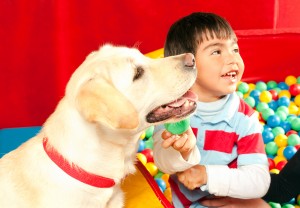Does your dog know when you are sad and come over to comfort you? Does he really experience feelings of sadness, joy, distress, fear, and love internally? According to new research, the answer is YES.
Just think of the look on your dog’s face when he rolls on his back in the cool dirt or long grass. Legs kicking in the air, pure joy radiating out of his eyes – he is experiencing a feeling. Joy!
Recent studies show that dogs “ have seven fundamental, basic, emotional systems that provide the ability to react to information about what enters the brain via the senses. These ‘magnificent seven’ include a seeking system to look for food, a fear system to respond to unfamiliar events that may be dangerous, a play system and a care system to raise offspring and form vital social attachments.” – Centre of Applied Pet Ethnology (COAPE).
Now, let’s take it a step further and examine one specific emotion dogs feel: the ‘fairness’ emotion. Another study done by Sharon Maguire of the Dog Breed Info Center “Suggests dogs are able to interpret fairness, as when one dog decides things are “not fair” and reacts by refusing to obey or getting emotionally upset. Dogs were asked to perform a trick and the dog’s enthusiasm was lowered when they saw other dogs being rewarded with food but receiving nothing for themselves. Some of the dogs even turned their heads, refusing to look at the human or other dog.” The hang-dog look when you don’t reciprocate a biscuit for a trick is proof of this fairness feeling. If you have another pet in your household, then you know that when one is fed, the other expects to be, too! Dogs sense when another animal in their house is getting a treat (they hear or smell it) and expect to receive a treat themselves.
Additional support for dogs having feelings involved a study that linked dog development to human development:
“Dogs also have the same hormones and undergo the same chemical changes that humans do during emotional states. Dogs even have the hormone oxytocin, which, in humans, is involved with feeling love and affection for others.”- What Do Dogs Know. Several articles cautioned owners not to give their pets human emotions – dogs have their own version of love – and it is a constant, simple, toddler version.
Dogs can tell if you are upset after a long day of work, and the dog won’t understand why, but he will pick up on your energy and body language. In the Psychology Today study, researchers analyzed their data and determined “that the mind of a dog is roughly equivalent to that of a human who is two to two-and-a-half years old. This conclusion holds for most mental abilities — including emotions. The difference is that dogs age quicker, thus going through their developmental stages faster. They develop all of the basic emotions: joy, fear, anger, disgust, and love but not the more complex emotions: guilt, pride, shame, and manipulation. So thinking a dog has ulterior motives in a situation is wrong.
Dogs are not confused about how they feel, unlike people!











